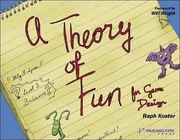(Created page with " thumb|By Raph Koster, 2005 ==Chapter 1: Why Write This Book?== ==Chapter 2: How the Brain Works== ==Chapter 3: What Games Are== ==Chapt...") |
|||
| Line 2: | Line 2: | ||
[[File:A-theory-of-fun-Koster.jpg|thumb|By Raph Koster, 2005]] |
[[File:A-theory-of-fun-Koster.jpg|thumb|By Raph Koster, 2005]] |
||
==Chapter 1: Why Write This Book?== |
==Chapter 1: Why Write This Book?== |
||
| + | Koster sets out the context and mission of his work in this chapter. Kids, he opens with, use games as learning tools even before learning language, and see patterns in games like tic-tac-toe even if they cannot understand them in the same way adult designers might. This ability seems to fall off with age -- Koster himself admits to having experienced the sad phenomenon of boredom from games that are too easy and games that are too difficult alike (10). This, combined with the growing cultural force of games and play's relation to work, is why Koster decided to "tackle the questions of '''what games are''', and '''what fun is''', and '''why games matter'''," the three major themes of his book (10). |
||
==Chapter 2: How the Brain Works== |
==Chapter 2: How the Brain Works== |
||
Revision as of 05:09, 13 October 2013

By Raph Koster, 2005
Chapter 1: Why Write This Book?
Koster sets out the context and mission of his work in this chapter. Kids, he opens with, use games as learning tools even before learning language, and see patterns in games like tic-tac-toe even if they cannot understand them in the same way adult designers might. This ability seems to fall off with age -- Koster himself admits to having experienced the sad phenomenon of boredom from games that are too easy and games that are too difficult alike (10). This, combined with the growing cultural force of games and play's relation to work, is why Koster decided to "tackle the questions of what games are, and what fun is, and why games matter," the three major themes of his book (10).